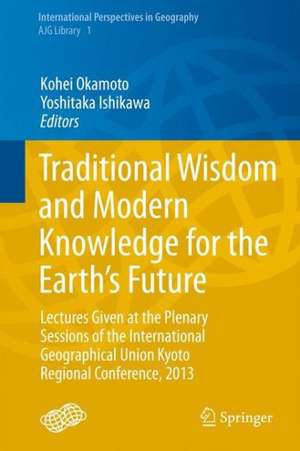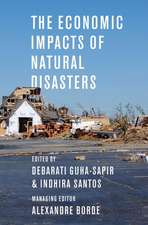Traditional Wisdom and Modern Knowledge for the Earth’s Future: Lectures Given at the Plenary Sessions of the International Geographical Union Kyoto Regional Conference, 2013: International Perspectives in Geography, cartea 1
Editat de Kohei Okamoto, Yoshitaka Ishikawaen Limba Engleză Hardback – 19 mar 2014
| Toate formatele și edițiile | Preț | Express |
|---|---|---|
| Paperback (1) | 588.11 lei 38-44 zile | |
| Springer – 3 sep 2016 | 588.11 lei 38-44 zile | |
| Hardback (1) | 892.59 lei 43-57 zile | |
| Springer – 19 mar 2014 | 892.59 lei 43-57 zile |
Din seria International Perspectives in Geography
- 20%
 Preț: 551.80 lei
Preț: 551.80 lei - 24%
 Preț: 729.72 lei
Preț: 729.72 lei - 18%
 Preț: 719.28 lei
Preț: 719.28 lei - 20%
 Preț: 555.16 lei
Preț: 555.16 lei - 24%
 Preț: 738.55 lei
Preț: 738.55 lei - 18%
 Preț: 784.79 lei
Preț: 784.79 lei - 18%
 Preț: 727.18 lei
Preț: 727.18 lei - 18%
 Preț: 1010.03 lei
Preț: 1010.03 lei - 18%
 Preț: 727.97 lei
Preț: 727.97 lei - 24%
 Preț: 774.87 lei
Preț: 774.87 lei - 24%
 Preț: 724.65 lei
Preț: 724.65 lei - 15%
 Preț: 701.59 lei
Preț: 701.59 lei - 18%
 Preț: 938.83 lei
Preț: 938.83 lei - 18%
 Preț: 885.47 lei
Preț: 885.47 lei - 18%
 Preț: 943.73 lei
Preț: 943.73 lei - 15%
 Preț: 644.95 lei
Preț: 644.95 lei - 15%
 Preț: 644.95 lei
Preț: 644.95 lei - 15%
 Preț: 640.24 lei
Preț: 640.24 lei - 15%
 Preț: 649.06 lei
Preț: 649.06 lei - 15%
 Preț: 642.51 lei
Preț: 642.51 lei
Preț: 892.59 lei
Preț vechi: 1088.52 lei
-18% Nou
Puncte Express: 1339
Preț estimativ în valută:
170.81€ • 177.25$ • 142.77£
170.81€ • 177.25$ • 142.77£
Carte tipărită la comandă
Livrare economică 17-31 martie
Preluare comenzi: 021 569.72.76
Specificații
ISBN-13: 9784431544050
ISBN-10: 4431544054
Pagini: 300
Ilustrații: X, 212 p. 116 illus., 87 illus. in color.
Dimensiuni: 155 x 235 x 15 mm
Greutate: 0.49 kg
Ediția:2014
Editura: Springer
Colecția Springer
Seria International Perspectives in Geography
Locul publicării:Tokyo, Japan
ISBN-10: 4431544054
Pagini: 300
Ilustrații: X, 212 p. 116 illus., 87 illus. in color.
Dimensiuni: 155 x 235 x 15 mm
Greutate: 0.49 kg
Ediția:2014
Editura: Springer
Colecția Springer
Seria International Perspectives in Geography
Locul publicării:Tokyo, Japan
Public țintă
ResearchCuprins
Traditional Wisdom.- Traditional Wisdom in Urban Development in Ancient China.- Clash of Civilizations is not a Fatality: Viewpoint of Geography.- Were There in the Japanese Language Originally Equivalents to the Words “Environment” and “Nature”?.- The Environment.- Nature and Society in Protected Areas: Can Development, Conservation, and Local Livelihoods Co-exist?.- Plural Knowledges and Modernity: Social Difference and Geographical Explanations.- No Going Back: The Political Implications of Ecological Novelty.- The Great East Japan Earthquake.- The 2011 Tohoku Disaster: Unexpected Earthquake and Forgotten Tsunami.- The Ecological Infra-structure as a Basis of the Reconstruction Plan for the Great East Japan Earthquake.- National Reconstruction Ground Design as Dual Recovery Strategy of Post-Disaster and Pre-Disaster Recoveries in Japan.
Textul de pe ultima copertă
The title of this book, Traditional Wisdom and Modern Knowledge for the Earth’s Future, is from the theme of the 2013 Kyoto Regional Conference of the International Geographical Union. Over the past few decades, globalization has strengthened connections among countries and regions of the world and has greatly changed existing geographies. However, this trend has also fostered various problems on a regional or global scale, such as economic imbalance, social fragmentation, political conflicts, and environmental crises. While acknowledging the world’s diversity, geography as a discipline must endeavor to resolve these problems by devising plans for cooperation and symbiotic existence of the different peoples of the world.
An old Japanese proverb, On-ko chi-shin, taken from a Chinese one, Wengu zhixin, says that only by exploring the old can one understand the new. People should first understand how traditional ideas, linked to interaction between society/culture and the environment, were formed in different countries and regions. Traditional wisdom, in harmony with the environment, remains prevalent. This book examines how we can mold the earth’s future through such traditional wisdom and modern knowledge from the nine keynote speeches of the Kyoto Regional Conference focusing on three topics: traditional wisdom, the environment, and the Great East Japan Earthquake.
An old Japanese proverb, On-ko chi-shin, taken from a Chinese one, Wengu zhixin, says that only by exploring the old can one understand the new. People should first understand how traditional ideas, linked to interaction between society/culture and the environment, were formed in different countries and regions. Traditional wisdom, in harmony with the environment, remains prevalent. This book examines how we can mold the earth’s future through such traditional wisdom and modern knowledge from the nine keynote speeches of the Kyoto Regional Conference focusing on three topics: traditional wisdom, the environment, and the Great East Japan Earthquake.
Caracteristici
Introduces international front-line debates on environmental issues Presents lessons learned from The Great East Japan Earthquake






